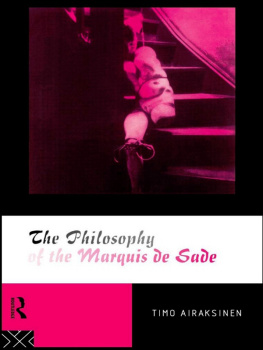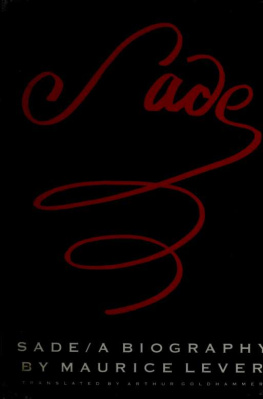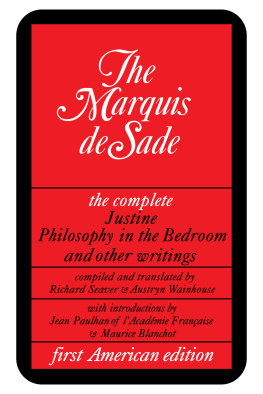Airaksinen examines Sades claim that in order to be happy and free we must do evil things. He discusses the motivations of the typical Sadean hero, who leads a life filled with perverted and extreme pleasures, such as stealing, murder, rape, and blasphemy. Secondary sources on Sade, such as Hobbes, Erasmus, and Brillat-Savarin are analyzed, and modern studies are evaluated. The Philosophy of the Marquis de Sade greatly enhances our understanding of Sade and his philosophy of pain and perversion.
Cover image: every effort has been made to contact the copyright holders of
this image. In the event of any queries, please contact Victoria Peters at
Routledge, London.
First published in the USA in 1991
by Longwood Inc.
as Of Glamor, Sex and de Sade
First published in the UK in 1995
by Routledge
11 New Fetter Lane, London EC4P 4EE
Simultaneously published in the USA and Canada
by Routledge
29 West 35th Street, New York, NY 10001
This edition published in the Taylor & Francis e-Library, 2001.
1991, 1995 Timo Airaksinen
All rights reserved. No part of this book may be reprinted or reproduced or utilized in any form or by any electronic, mechanical, or other means, now known or hereafter invented, including photocopying and recording, or in any information storage or retrieval system, without permission in writing from the publishers.
British Library Cataloguing in Publication Data
Airaksinen, Timo
Philosophy of the Marquis de Sade I. Title 843.6
Library of Congress Cataloguing in Publication Data A catalogue record for this book has been requested
ISBN 0-415-11228-1 (hbk)
ISBN 0-415-11229-x (pbk)
ISBN 0-203-00483-3 Master e-book ISBN
ISBN 0-203-17439-9 (Glassbook Format)
eISBN: 978-1-13483-156-2
PREFACE
I gratefully acknowledge the following persons who have provided valuable help during the various stages of this project: Gerald Doherty, Pamela Doherty, Maija-Riitta Ollila, Ilkka Patoluoto (), George Berger, Juha Airola, Paul J. Johnson, Heta and Matti Hyry, Jarkko Savolainen, Manfred Holler, Aristides Baltas, and Timothy Stroup. Financial support was provided by the Humanities Council of the Academy of Finland. The Department of Philosophy, University of North Carolina at Chapel Hill, offered a congenial environment to develop the first ideas which led towards the book, although I do not know whether they knew what they were spawning. My thanks are due to Professors Jay Rosenberg and Geoffrey Sayre McCord. I have presented material borrowed from this book in Helsinki, Nottingham, Dominguez Hills, Athens, Jerusalem, and Atlanta. I have profited from all of these discussions, regardless of the degree of dismay the audiences might have felt and expressed.
Sade is not an easy topic. The subject matter is that which is evil, and perhaps one cannot quite want to know what evil is like. Sade is a revolutionary thinker who has much to offer any student of ethics, literary criticism, and cultural history. The characterization of virtue as a vice, the deliberate repetitiveness of his style, and the enlightened choice of what is worthless, are all paradoxical themes which Sade introduces and analyzes with great care and skill. My basic motive in writing this book has been the conviction that there is much in this world which is neither directly visible nor readily thinkable. One is a victim of shame, which makes one assume that something does not exist because it should not. Sade deals efficiently with this problem by forcing his reader to recognize what is dirty, disgusting, and forbidden. A liberating effect follows when the reader overcomes his shame.He is then able to take a look behind without becoming a pillar of salt, as happened once outside Sodom and Gomorrah.
The book is divided into nine chapters. The second, on the meaning of perversion, is perhaps more difficult and certainly more analytical than the rest. It presents a review of human action and weakness as a technical theory to be deconstructed in the chapters that follow. It cannot be skipped without losing much of the main thesis; however, the chapter can be read cursorily so that one will at least get an impression of the notions of perversity and moral harm to self. The final chapters deal with more general issues, like censorship and the primacy of values in human life. Sade himself is the real hero of the book.
INTRODUCTION
D. A. F. Sade is a challenge to anyone who reads his black, or clandestine and censored novels. This book is a systematic study of the kind of challenge that is involved. At the same time it is a treatise on evil in the private world, where there is a mirror reflection of the social world of coercion, persecution, punishment, and war. I have said something about the aspects of cruelty in the public world in my book Ethics of Coercion andAuthority. In the present book we shall encounter the enigmatic aspects of privacy when it is accompanied by actual plans to be wicked which is a stronger sense of wickedness than weakness of the will, to say nothing of mere error and self-deception.
Sades novels invite a mixed mode of reading which combines literary criticism and moral philosophy. Sade is indeed a kind of moralist, but because he deals with a subject matter which is buried deep in the Id, it would be silly to think that he could provide a neutral description of the facts. Instead of science or ontology, one finds a rich assemblage of metaphors and other rhetorical devices, used in a narrative which works like no other text. The reader of Sade must learn a method of coping in the jungle of nausea and terror Sade creates.
Four terms provide the skeleton of my study. The first, inversion, refers to Sades habit of turning his topic inside out. He deals with a topic as if it were a rubber ball that is cut open, and the inside pulled out with firm hands; the result is a deformed hemispherical object, its shape forever destroyed and half its insides obscenely visible. Such inverted objects are what Sades world is all about; they are far from any neat mirror image of familiar objects like virtue, sex, and love. The deformation involved is itself a complex procedure and interpreted in terms of the rituals of debauchery. It starts from transgression the crossing of a limit but in the Sadean world the first step is merely destruction, because it leads nowhere.Man is confronted by nature, an enemy which is as majestic as it is incomprehensible and unconquerable. Therefore, the first step across the borders of decency and shame promises only fear and trembling. It shatters the borders.














